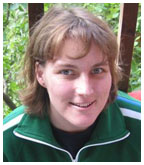|
Web Exclusives: Alumni Spotlight
September 15, 2004: Taking
on Tibet A year ago, Katy Walden ’95 took a break from her nine-to-five marketing job in San Francisco for a two-week trip through Tibet. But this was no ordinary vacation. Walden’s experience is recorded in Tibet Diary, a PBS documentary airing nationwide this fall. The journey began when Walden responded to an advertisement on a website calling for Americans who had never been to Tibet. For Tibet Diary, D3 Productions, a company in Oakland, California, that produces a weekly show about China for PBS, wanted to profile two Americans with little knowledge of Tibet as they traveled through the country, coming in contact with its people, culture, religion, and politics. At Princeton, Walden, an English major, was the quiet one in precept who read all the books but rarely spoke out of shyness. But her reserve didn’t stop her from answering the ad. In Tibet, Walden found herself braving altitude sickness and bumpy roads to meet monks, drink beer with Tibetan folk dancers, and step into people’s homes — all the while being followed by a camera crew. They started the trip in the capital, Lhasa, proceeded to Shigatse, the second-largest city, and then to the more rural region of Shannan, before returning to Lhasa. Initially uneasy about being filmed, Walden soon became engrossed in Tibet’s contradictions, a country where pit toilets coexist with Internet cafes and posters of Mao hang in homes with Buddhist shrines. In Lhasa, she stopped to talk with shopkeepers who sold furry hats, while her cotraveler borrowed their guitar to sing them a song, drawing crowds of children. Walden says the men praised China’s economic influence even as video cameras looked down monitoring the public square. In another encounter at a monastery, she realized the universal power of a smile to communicate across cultures. While watching the chanting monks, she noticed one monk making faces to get her attention. When she looked over, he pointed to the corners of his mouth to get her to smile. Each night, Walden turned a camera on herself to talk about the
experience. The highlight of the trip, she says, was meeting a variety
of Tibetans. Access to political dissidents was impossible due to
government minders, she says. “It enabled me to learn more
than tourists looking at the pretty monasteries,” she adds.Before
the trip, all Walden knew about Tibet was summed up by “Free
Tibet” bumper stickers and sand mandalas, a Buddhist spiritual
art form. Today, she has a more complex view of Tibet, its relationship
with China, and its image in the West. Admittedly no expert after
just two weeks in Tibet, Walden senses that independence is not
feasible due to China’s extensive influence. Many Tibetans,
she says, genuinely appreciate China’s improvements to education,
economic opportunities, and standard of living. “It is too
late to simply say ‘China out of Tibet,’” she
says. “What is clear in the documentary is that we came away
confused. There’s a lot to learn.”Katy returned to her
job and life in San Francisco with a newfound sense of confidence
and a penchant for travel, meeting people, and asking questions.
She sold her condominium to free herself up to travel more overseas.
Of her Tibet experience, she says, “It was kind of like winning
the lottery.” By Shona Crabtree ’95 Shona Crabtree is a freelance writer in San Francisco.
|
||

